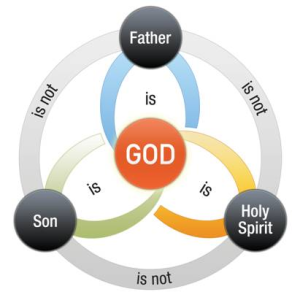Relationships are critical to one’s existence. Individuals need compassion that can only come from companionship. It should not be surprising since the Bible presents God as an eternal relationship, that the Bible also promotes the idea of relationships in general. This post will demonstrate the importance of relationships as it exists in the nature of God, the relationship that the believer possesses with the Triune God, and the importance of an individual to possess strong relational ties to others.
The Father (Yahweh) is God
While the Scripture does not use the term trinity, such an idea “is a logically warranted inference from what Scripture does say about God.”[1] The Scripture indicates that God is one (Deuteronomy 6:4), yet consisting of three persons. For example, Yahweh, the Father, is shown to be God. For example, God introduces Himself to Moses and says, “Say this to the Israelites: Yahweh, the God of your fathers, the God of Abraham, the God of Isaac, and the God of Jacob, has sent me to you” (Exodus 3:15). Yahweh, also translated “LORD” in some translations, is the personal identification of the Father. Gerald Bray rightly suggests that “God the Father is the person who ordains, establishes, judges and appoints.”[2] Yet, Yahweh is not the only person identified as God in Scripture.
Jesus (Yeshua) is God
Jesus of Nazareth is also identified as God. Identified as the Messiah, Paul writes that “The ancestors are theirs, and from them, by physical descent, came the Messiah, who is God over all, praised forever” (Romans 9:5). In the triune relationship of God, Bray identifies Jesus as the one who “appears as the Redeemer, the sacrificial victim and the mediator.”[3] Thus, the Father is God and the Son is God, but there is one more member to the Godhead that is also addressed.
Holy Spirit is God
The Holy Spirit is identified as God. Perhaps one of the clearest examples of the Holy Spirit’s divinity is found in Acts 5. When Ananias and Sapphira lied about their gift, Peter said to Ananias, “why has Satan filled your heart to lie to the Holy Spirit and keep back the proceeds from the field” (Acts 5:3)? He goes on to say, “You have not lied to men but to God” (Acts 5:4)! Bray states that the Holy Spirit “is the Sanctifier, the first-fruits of the inheritance of the glory to come. He dwells in our hearts by faith…and is responsible both for giving us access to the Father and for producing the image of Christ in us.”[4] Therefore, although God is one (Deuteronomy 6:4), God is eternally three persons in One entity. It is interesting as God could be said to be an eternal relationship.
Relationship between Members of the Monotheistic Godhead
A special relationship exists between the individuals of the Godhead. In fact, “the doctrine of the Trinity offers an example for interpersonal relationships, not the least is family relations.”[5] In fact, the great blessing is found in that an individual is able to be brought into this eternal relationship. When a believer begins a relationship with God, that one is indwelled with the Holy Spirit. Jesus states that the believer would receive the Holy Spirit and the believer would “know Him, because He remains with you and will be in you” (John 14:17). Therefore, the believer is drawn into a relationship with the Godhead as one is filled with the Holy Spirit, has the Son as an advocate, and possesses the forgiveness of the Father.
Interpersonal Relationships
Since relationships hold such a high value to the Triune God, the believer should place a high value on one’s relationship with others. Christ put such a high value on relationships that He stated that the second highest commandment in all the law, after loving God with all one’s being, was that one should “love your neighbor as yourself. All the Law and the Prophets depend on these two commands” (Matthew 22:39-40). Unfortunately, Christians, far too often, do not place enough emphasis on relationships. Minor distinctions and interpretations cause Christians to part ways. While it is important to maintain a high level of focus upon proper doctrine, most church splits do not occur over such issues. In fact, this writer knows of a church that split over differences of opinion concerning the brand of toilet paper used in the church’s restrooms. Do such mentalities represent highly valued relationships? Certainly not!
Conclusion
Christianity is about relationships. Theologically, God is demonstrated to be an eternal relationship. Spiritually, an individual enters into a relationship with the eternal God when one accepts Christ. Ethically, a Christian is required to place a high value upon one’s personal relationships with others. Jesus indicated that one would display their faith by demonstrating love to others (John 13:35). The Christian needs to ensure that he or she holds a strong relationship with God and holds strong relationships with those around them. Christian leaders need to understand the Triune relational nature of God and express the need for personal relationships with others.
Note: This work represents the academic work of Pastor Brian Chilton. The contents of this article have been submitted to the author’s university. Any attempt to improperly use the information found within this article for academic papers without proper citation may result in charges of plagiarism.
Bibliography
All Scripture, unless otherwise noted, comes from the Holman Christian Standard Bible. Nashville: Holman Bible Publishers, 2009.
Bray, Gerald. The Doctrine of God, Contours of Christian Theology. Downers Grove: IVP, 1993.
Feinberg, John S. No One Like Him: The Doctrine of God, Foundations of Christian Theology. Wheaton: Crossway, 2001.
Copyright. Pastor Brian Chilton. 2014.
______________________________________________________________________________________
[1] John S. Feinberg, No One Like Him: The Doctrine of God, Foundations of Christian Theology (Wheaton: Crossway, 2001), 438.
[2] Gerald Bray, The Doctrine of God, Contours of Christian Theology (Downers Grove: IVP, 1993), 146.
[3] Ibid, 147.
[4] Ibid.
[5] Feinberg, 441.









